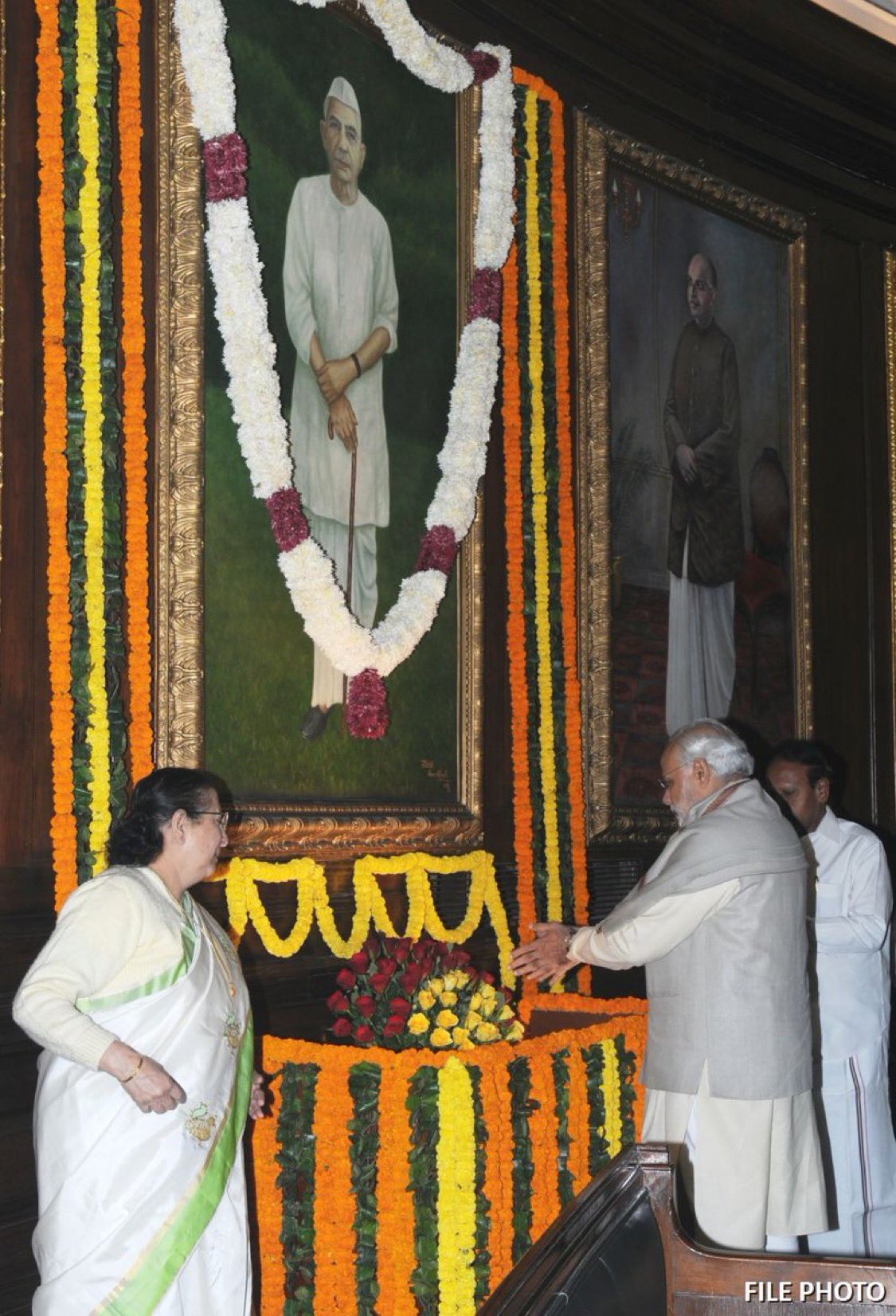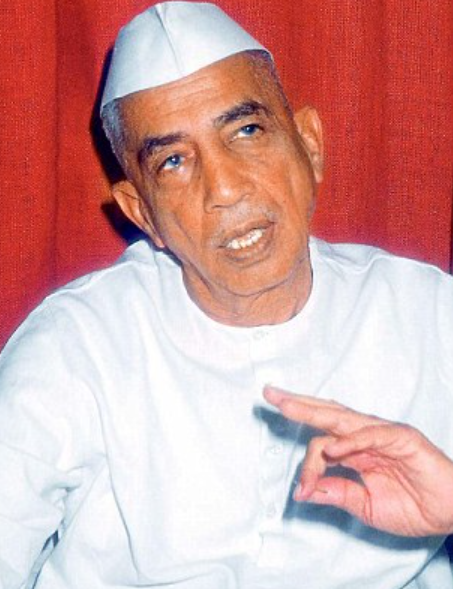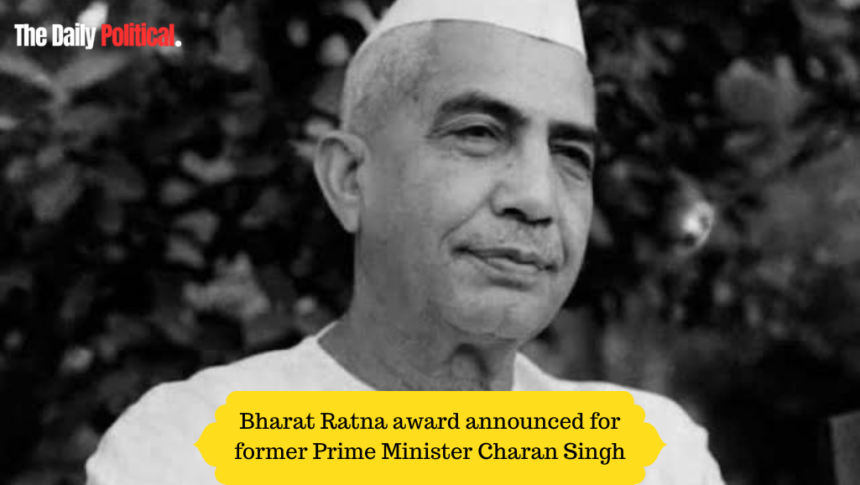How a boy from a middle-class farmer family became the messiah of farmers across the country, Modi government announced the highest civilian honor Bharat Ratna.
The announcement of the Bharat Ratna award for former Prime Minister Charan Singh has been made. Born into a farming family, Singh first became an MLA in 1937.
New Delhi, February 9 : The Government of India has announced Bharat Ratna awards for three additional individuals, including former Prime Minister Choudhary Charan Singh, recognized as a prominent leader in the farming community. His grandson, Jayant Chaudhary, serves as the chief of Rashtriya Lok Dal. Let’s know about choudhary Charan Singh’s background.

Bharat Ratna Charan Singh : Born in a farmer family:
Born in 1902 into a middle-class farming family in Noorpur, located in the Meerut district of Uttar Pradesh, Charan Singh’s early life laid the foundation for his future endeavors. Graduating in science in 1923, he furthered his education, earning a master’s degree from Agra University in 1925. Equipped with legal training, Charan embarked on his professional journey in Ghaziabad before relocating to Meerut in 1929. His association with the Congress Party began shortly thereafter, marking the start of his impactful political career.
#WATCH | Chaudhary Charan Singh, PV Narasimha Rao Garu and M S Swaminathan conferred with the Bharat Ratna.
— ANI (@ANI) February 9, 2024
RLD chief Jayant Chaudhary says, "It is a big day & an emotional moment for me. I want to thank the President, government & PM Modi because this was part of his… pic.twitter.com/NfMaaprMZT
Bharat Ratna Charan Singh : Became MLA for the first time in 1937:
Charan Singh’s political journey began with his election to the Uttar Pradesh Assembly from Chhaprauli in 1937, marking the commencement of a long and distinguished career. He continued to serve his constituency in the Assembly in subsequent years: 1946, 1952, 1962, and 1967.
Ascending through governmental ranks, he assumed the role of Parliamentary Secretary in the administration of Pandit Govind Ballabh Pant in 1946, where he contributed across diverse portfolios including Revenue, Medical and Public Health, and Justice. In June 1951, he was appointed as a cabinet minister, entrusted with the Justice and Information departments. Subsequently, in 1952, he assumed the mantle of Minister of Revenue and Agriculture under Dr. Sampurnanand’s cabinet.
His tenure witnessed dynamic transitions, from serving as the Home and Agriculture Minister in C.B. Gupta’s ministry (1960) to Minister of Agriculture and Forests in Sucheta Kripalani’s administration (1962-63). Demonstrating versatility, he transitioned to the Local Self-Government Department in 1966 after relinquishing his responsibilities in the Agriculture Department in 1965.

Bharat Ratna Charan Singh : Fierce Advocate Against Nepotism and Corruption:
Following the split within the Congress, Chaudhary Charan Singh assumed the role of Chief Minister of Uttar Pradesh for the second time in February 1970, backed by the Congress Party. However, President’s rule was instituted in the state on 2 October 1970. Renowned for his uncompromising stance against inefficiency, nepotism, and corruption in governance, Charan Singh emerged as a formidable leader during his tenure in various capacities within Uttar Pradesh. Widely acknowledged as a brilliant parliamentarian and pragmatic figure, he was celebrated for his eloquence and unwavering convictions.
Bharat Ratna Charan Singh : Significant Contribution to Land Reform Efforts
He is credited with spearheading land reforms in Uttar Pradesh. His pivotal role in formulating and ratifying the Departmental Debt Relief Bill of 1939, aimed at alleviating rural debt, earned him recognition. As a consequence of his initiatives, salaries and perks of ministers in Uttar Pradesh saw substantial reductions. Additionally, during his tenure as Chief Minister, he played a crucial part in enacting the Land Holding Act of 1960. This legislation aimed to standardize landholding limits across the state by reducing the maximum permissible size.
Only a handful of politicians in the nation have attained widespread popularity through their grounded approach and seamless engagement with the public. Charan Singh drew immense strength from his close association with hundreds of thousands of farmers, reflecting his commitment to grassroots connections.
Leading a modest lifestyle, Chaudhary Charan Singh dedicated his leisure time to reading and writing. He authored numerous books and booklets, notable among them being ‘Abolition of Zamindari’, ‘Poverty in India and its Solution’, ‘Land for Farmers’, ‘Prevention of Deviation of Holdings Below a Certain Minimum’, ‘Co-operative Farming’, and ‘X-Rad’.







